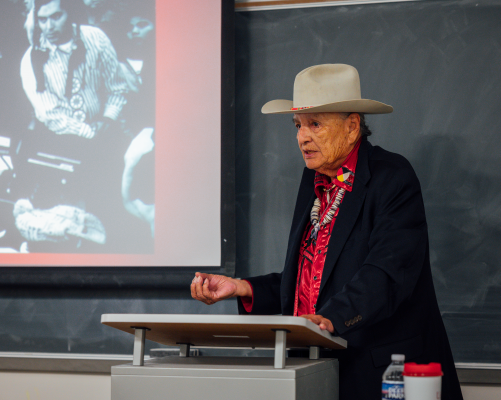
Welcome Home Project in the Classroom: Elder John Thomas Gives Lecture as Part of Ongoing Partnership
Thanks to the Welcome Home Project, Lenape Elder John Thomas of the Delaware Tribe of Indians shared his presentation titled “Boarding School to Activist to Elder” with Associate Professor of History Lori Daggar’s Native American Activism and Red Power class.
Since its inception in 2021, the Welcome Home Project has been a partnership between Ursinus College, the Delaware Tribe of Indians, and the Perkiomen Valley School District dedicated to increasing understanding and awareness of the history and culture of the Lenape people in the Perkiomen Valley region and its surrounding communities.
As part of this collaboration, educational programs and co-curricular activities have been developed to promote greater awareness and appreciation for the Lenape people and their culture. On Nov. 6, one such educational program took place in Associate Professor of History Lori Daggar’s Native American Activism and Red Power class.
Elder John Thomas shared his presentation, “Boarding School to Activist to Elder,” which provided historical context and firsthand accounts of critical flashpoints in the history of the Lenape people and Native American activism.
“John’s storytelling and memories breathe life into the things we read in class throughout the semester,” Daggar said. “It’s one thing to read, discuss, and analyze the history of Indigenous activism and another to have the opportunity to listen to and ask questions of someone who has lived that history.”
During his presentation, Thomas discussed the history of the Lenape and their forced removal westward, as well as the Allotment Act, which divided tribal lands into separate, private plots in an effort to dispossess Indigenous nations further. He then described his experience at Oak’s Indian Mission Children’s Home, a boarding school that separated families and sought to indoctrinate young Native children into Christianity. Thomas also discussed his involvement with the American Indian Movement in the 1970s.
“John’s perspective, combined with careful reading and discussion of the past, is a powerful and necessary way to learn this history,” Daggar said.
Thomas’ visit is just one of the many ongoing programs facilitated by the Welcome Home Project. Thomas revisited the same class on Nov. 13, allowing students to interview him.
“The interviews were crucial to document John’s stories and experiences,” Daggar said. “Our goal is to add them to his archive, which we’ve been gradually building at the Myrin Library over several years.”
Beyond Daggar’s class, the Division of Inclusion, in partnership with the Delaware Trible of Indians, has organized and hosted the Lenape Symposium on campus during the past two summers, welcoming representatives from the Tribe and other organizations to present and lead panel discussions on a range of topics. Last year, with funding from the College Innovation Council, the college supported “Partnership for Just and Resilient Food Systems.” Among other things, representatives from the Tribe, as well as Ursinus faculty, staff, and students in the food studies minor meet with the goal of further cultivating Ursinus’s relations with the Delaware Tribe.
“It is important that this work takes place both in and beyond the classroom,” Daggar said. “Ursinus is fortunate to have the opportunity to learn from John, his partner Faye, and the broader Delaware Tribe of Indians.”
